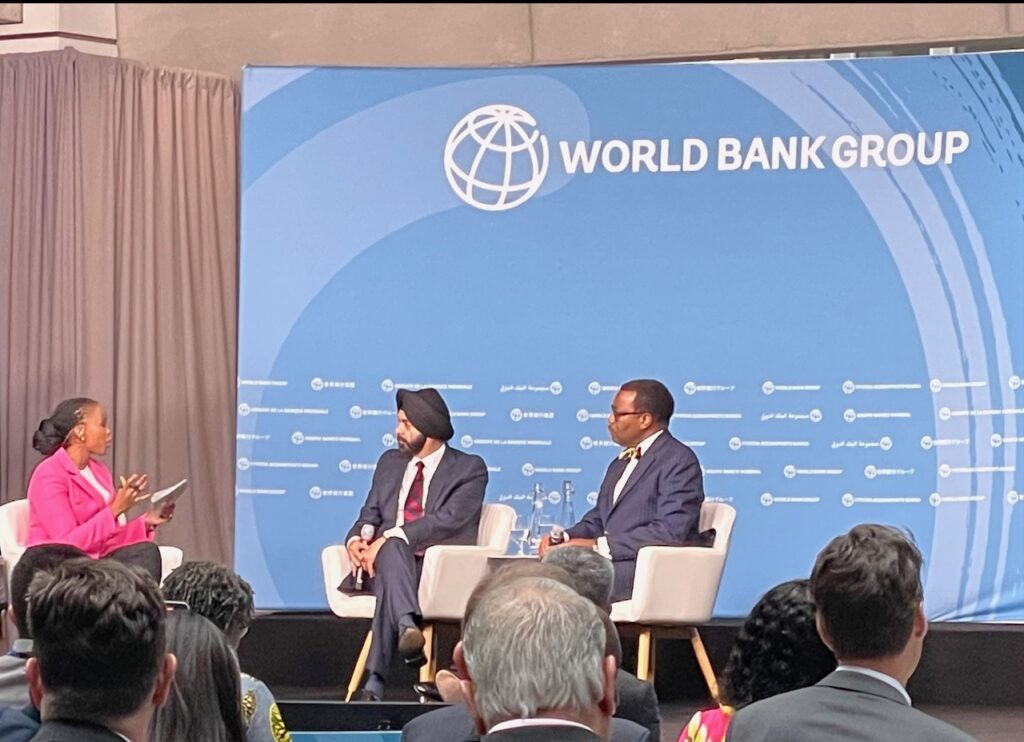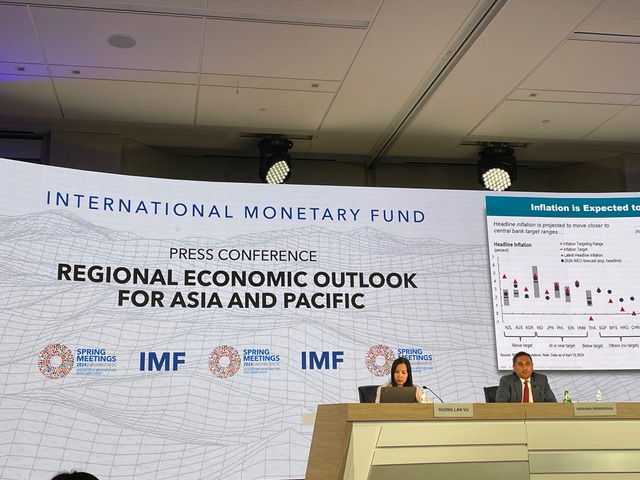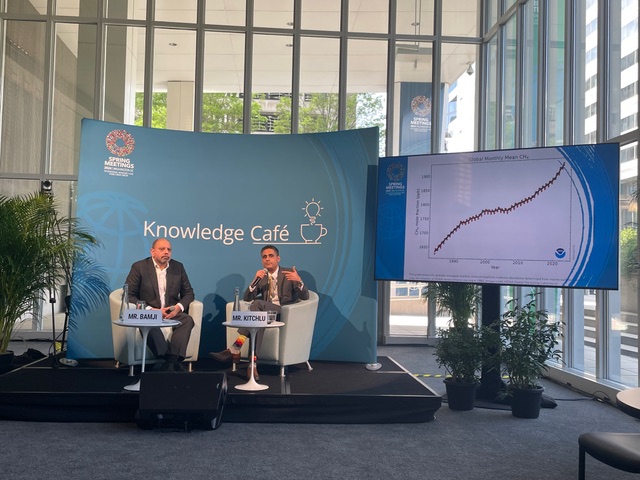 President of World Bank Ajay Banga and President of African Development Bank, Akinwumi Adesina during the World Bank’s Flagship event on Energizing Africa on April 17, 2024, at the World Bank in Washington DC. PHOTO: T. Vishnudatta Jayaraman, News India Times
President of World Bank Ajay Banga and President of African Development Bank, Akinwumi Adesina during the World Bank’s Flagship event on Energizing Africa on April 17, 2024, at the World Bank in Washington DC. PHOTO: T. Vishnudatta Jayaraman, News India TimesWashington DC: President of the World Bank Group, Ajay Banga commended India’s progress in Digital Public Infrastructure (DPI) as “exemplary” while also highlighting its efforts on distribution of social benefits and utilizing the system to enhance efficiency in areas such as education and government departments.
On the sidelines of the 2024 Spring Meetings of the International Monetary Fund (IMF) and the World Bank Group in Washington DC, Banga told News India Times, “A lot of India’s work is currently being taken by the World Bank. India and a few other countries have done good work on Digital Public Infrastructure,” adding “We’re trying to drive that to other emerging market economies. As you know, we are taking our knowledge bank and creating a new digital vertical. One of the reasons for creating it is to use the learnings from countries like India.”
Delegates and officials at the week-long spring meetings, also lauded India’s progress in DPI, reducing methane emissions, access to electricity and energy transition, and support for climate finance matters.
Minister of Finance, Republic of Maldives, Dr. Mohamed Shafeeq told News India Times, “Among the large economies, India is one of the fastest growing nations. The strides the Indian government has made in the economy in building infrastructure services and digitalization of economic infrastructure is commendable. In the Maldives, India is seen as an important development partner with great historical ties.”
 Krishna Srinivasan while discussing the Regional Economic Outlook for Asia and Pacific on April 18, 2024, at the International Monetary Fund in Washington DC. PHOTO: T. Vishnudatta Jayaraman, News India Times
Krishna Srinivasan while discussing the Regional Economic Outlook for Asia and Pacific on April 18, 2024, at the International Monetary Fund in Washington DC. PHOTO: T. Vishnudatta Jayaraman, News India TimesDirector, Asia and Pacific Department, IMF, Krishna Srinivasan, while discussing the Regional Economic Outlook for Asia and Pacific noted, “India is one country which has registered very strong growth of 6.8 per cent for FY 24-25. India has successfully navigated multiple shocks in recent years, and it’s now one of the fastest growing major economies in the world.”
He further added, “We have 15 million people being added to the labor force every year. If India really wants to benefit from this population added to the labor force, it has to invest big time in both education and health.”
At a press conference, Banga said the “World is facing a set of intertwined challenges…There’s the climate crisis, food insecurity, pandemics, fragility and there is clearly a need to accelerate access to clean air, water and energy…” while adding, “We’re working with partners to scale high integrity carbon markets and forestry. We think that’ll benefit people in the developing countries.”
While emphasizing that the World Bank is “continuing to develop a new approach to track climate outcomes based on impact” Banga warned that it is evident that even with governments, multilateral institutions and philanthropies collaborating it is hard to get trillions in yearly funding needed for addressing climate issues, fragility, and inequality worldwide.
Advisor, Climate Finance Policy Unit, IMF, Prasad Ananthakrishnan told News India Times, “India provided leadership in the G20 [2023 New Delhi Summit] thereby setting the agenda for all the sustainable finance and climate related issues. So, Brazil is picking up on many of those agenda items. So, this continuum is very important in this sense.”
Ralph Recto, chair of G24 nations, in which India is a leading member, told News India Times, “India is a very important country, and it can definitely contribute with regard to the problems of the G24” while commending its growth in DPI.
While talking about World Bank’s efforts to provide access to electricity to 600 million people in Africa, Banga said, “I think electricity is a human right” and that electricity is mechanism by which people can get access to education.
“I grew up in India, I saw the change in my own country when I grew up with the increasing access to electricity. I saw it in my own childhood. I’m aware of this directly in my own experiences,” Banga added while recalling his own experiences with electricity growing up in India. “So, all I can say is think about this as the important human right, which allows us to build jobs and capabilities in Africa.”
During the spring meetings, Banga also announced a slew of new measures to make the Bank “more agile, faster, and easier to navigate.” He underscored that the Bank has been working on aspects including speed, and simplicity while pointing out that the “vision and mission of the bank” is to cater to the growing needs of the world.
The World Bank has also embarked on an ambitious plan to tackle the harmful effects of methane emissions in 15 countries. At COP28, Banga announced that the Bank will lead efforts on bending the methane curve and launched a blueprint for accelerating methane action.
 Rahul Kitchlu speaking during the “Bending the Methane Curve” event on April 16, 2024, at the World Bank in Washington DC. PHOTO: T. Vishnudatta Jayaraman, News India Times
Rahul Kitchlu speaking during the “Bending the Methane Curve” event on April 16, 2024, at the World Bank in Washington DC. PHOTO: T. Vishnudatta Jayaraman, News India TimesDuring an event, “Bending the Methane Curve,” Manager for the Operationalization Unit, Climate Change Group, World Bank, Rahul Kitchlu said Indian dairy animals contributed to about 10 per cent of greenhouse gas emissions and 52 per cent of methane emissions.
However, the Bank achieved progress through its work with over three million smallholder dairy farmers on animal feed interventions, nutrition interventions, and training and capacity building across many provinces. “That certainly over delivered on the commitments of the program on methane emissions reduction. The target was about 10 per cent but about almost 14 per cent reduction was noticed,” Kitchlu added.
Talking about examples of success in energy projects, Partner, Head of Energy Infrastructure, ACTIS, Lucy Heintz, said India has an enormous ambition around energy transition of about 500 gigawatts by 2030.
“The government really means business on this. It has invested in the enabling environment – that clear framework. It has a fantastic private sector and public sector partnership around investment in transmission…” Heintz said adding “And it has this programmatic approach in terms of route to market for power projects, which has been sustained over a long period of time.” Source: https://www.newsindiatimes.com/ajay-banga-lauds-indias-progress-in-digital-public-infrastructure/
